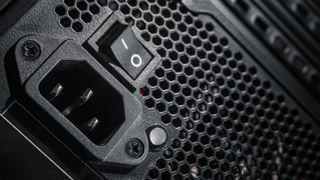New Intel Alder Lake rumor could point to big upgrade headaches for some people
Fresh rumor may cause concern over power supply upgrades – but let’s not get carried away

Intel’s Alder Lake processors will be more power-hungry than their Rocket Lake predecessors, if the latest from the rumor mill is to be believed.
Chuck plenty of salt around with this one, for sure, but as uncovered by Tom’s Hardware, Chinese tech outfit FCPOWERUP, which majors in power supplies – and has leaked correct info in the past – has claimed (on Weibo) to have obtained Intel’s power requirements for its 12th-gen CPUs.
- Here are the best gaming PCs
- We’ve picked out all the best processors
- And the best cheap RAM prices and deals
The info, which is seemingly drawn from Intel specs meant for power supply manufacturers, shows that Alder Lake chips will run with base TDPs of 125W, 65W and 35W, and they’ll mirror the continuous current requirements of Rocket Lake processors (and indeed Comet Lake before that).
Where Alder Lake ups its demands, however, is in peak current, and the tiny spikes that can occur momentarily with a chip. If these specs are correct, Alder Lake will raise these demands by as much as 28% in the 65W bracket, 24% with 35W silicon, and 15% with the top-tier 125W CPUs.
However, remember that this is peak demand. While this gets into pretty techie PSU territory, we’re talking about ‘PL4’ power draw, or the absolute peak output supplied by the 12V2 power rail to the processor for an exceptionally brief time (a matter of milliseconds). This is very different to the continuous current demands: you may have heard of the ‘PL2’ spec of a CPU, which is the maximum continuous power draw – albeit for a short period itself, but a number of seconds, not just a mere fleeting millisecond spike – that the processor can run flat-out at top Turbo speeds.
What does this mean for the average PC owner looking at an upgrade to Alder Lake, then? FCPOWERUP floats the tentative piece of speculation that consumers could be looking to budget around 50W to 100W more in terms of their PSU’s headroom compared to current Rocket Lake (or Comet Lake) chips, with the exact amount obviously depending on how far up Intel’s CPU range they’re wanting to go (as ever, the more powerful processors need more wattage).
Analysis: Watt on earth’s going on here then?
Before you start pulling your hair out regarding the possible need to upgrade your power supply to be ready for Alder Lake, let’s underline a few things here. These are tiny spikes of micro-usage as noted, and that figure of 50W to 100W extra above Rocket Lake is mere speculation based on an unproved (and possibly fabricated – or if it is real, maybe outdated) piece of Intel documentation.
Get daily insight, inspiration and deals in your inbox
Get the hottest deals available in your inbox plus news, reviews, opinion, analysis and more from the TechRadar team.
We don’t know the truth behind it, and we definitely shouldn’t be drawing any conclusions on the power demands of Intel’s 12th-gen processors at this point, not until we’ve heard from Team Blue itself on the matter.
Indeed, we’d expect that Intel would surely be cautious around introducing a new range of silicon that required a number of users to be looking at a PSU upgrade (as obviously folks buying an Alder Lake processor in the future will also need a new motherboard with an entirely different socket, as we already know).
What does introduce an element of confusion is that as Tom’s points out, there could be issues with older multi-rail power supplies which have a 12V rail with a 20A output limit – and that could be problematic (if the above info is correct, of course).
More broadly, the rumors around next-gen PC hardware needing more wattage aren’t just confined to Alder Lake, with AMD’s next Ryzen chips due later in 2022 expected to up TDPs. And this isn’t just about processors, with both RTX 4000 and RDNA 3 graphics cards expected to crank up power consumption considerably.
All of this is just speculation at this point, but the hints coming from the rumor mill certainly suggest that if you’re getting a new PC, you should be sure to pick a PSU with plenty of headroom for wattage. That’s always been good advice really, though, to ensure your PC runs comfortably and stably, plus it gives you plenty of scope to upgrade to more powerful components in the future.
- Check out the best PC components for your rig
Darren is a freelancer writing news and features for TechRadar (and occasionally T3) across a broad range of computing topics including CPUs, GPUs, various other hardware, VPNs, antivirus and more. He has written about tech for the best part of three decades, and writes books in his spare time (his debut novel - 'I Know What You Did Last Supper' - was published by Hachette UK in 2013).
Most Popular

